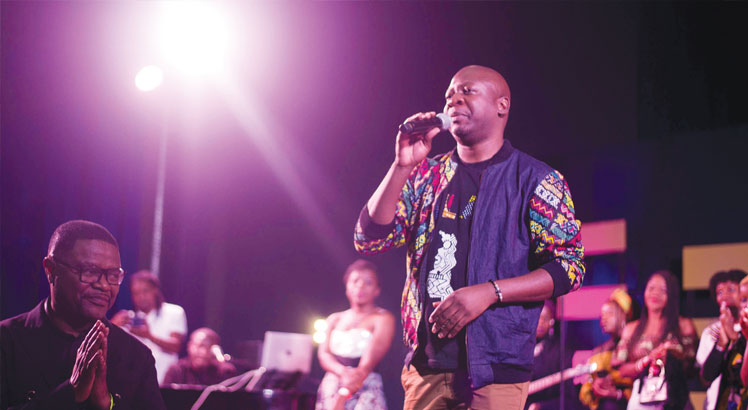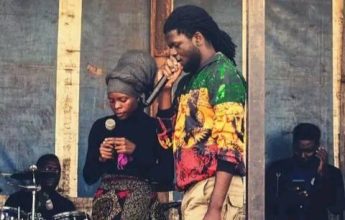Master music talk
 The songs are a personification of the man. Songs of reason.
The songs are a personification of the man. Songs of reason.
Who can forget Ku Kachebere, the song that takes you to the heart of Kachebere Major Seminary in Mchinji? A song that inspired many young Catholics to enter the priesthood vocation.
….Simasewera, ukuyambawa iwe
Ku Kachebere, tikupita….
The song went in part. Or, you remember Charlo, that wayward youth, who used to play truant in school and is now licking his wounds of poverty and misery.
Yet, others into choral works remember Nang’omba, Professor Reverend Immanuel Mlenga’s composition for the Choral Workshop, which featured singers like Maria Chidzanja-Nkhoma.
…Nang’omba adanka kuti aye
Kaya, kaya
Nanchichi adanka kuti aye
Kaya, kaya
Namgogoda adanka kuti aye
Sitidziwa….
These are some of the songs that have made Mlenga a master of his art. When he sits down to reflect on his music career, Mlenga has all the reason to smile. It was a great leap.
“When I released Ku Kachebere, there were only a few Malawian musicians. There was only one radio station in those days. I sold 150 000 copies, bringing K2.5 million [about $10 000] into my pocket. That was the time I made hay as the sun still shone and started intensifying my projects,†he says, pointing to a primary school block.
Mlenga, who got his social anthropology professorship at the Bologna University in Italy, believes if musicians used the money they make at their peak properly, the future would still be bright, even if other artists overtake them.
“It pains me whenever I hear a musician who was great at one point asking for alms when they are in need. With the little I got, I started churning out projects,†said Mlenga, who holds a Royal College of Music Grade 5 certificate.
His projects
Currently, he is running nursery and primary schools, the Mlenga Academy and the Immanina College while at the same time, farming intensively at his home village—Mlenga, in Traditional Authority Mwambo’s area in Zomba. But the musician in him has not vanished, as he imparts knowledge on the next generation of musicians.
His agriculture works at his home along the Zomba-Jali-Phalombe Road and Malosa has led him to be a model farmer. Growing and raising different crops and livestock, Mlenga—who also holds a Philosophy and Theology Diploma from Chancellor College—brings out the philosophy that Malawians should not fear the dirt in the soil, where lies gold.
He is running a music school, which includes lessons in studio engineering, composition, music production and other aspects of music. In his studios, he records using live instruments in a world where music production is revolving around computer-generated sounds.
“That is killing Malawi music. Music demands creativity. One must create their own lines. People need basslines they have never heard before,†says Mlenga, who turns 55 on October 23 this year and fluently speaks German, Italian and French.
The use of computer-generated music is the result of the many Malawian musicians who think traditionally, rich Malawian music will not sell abroad. But Mlenga chooses to differ: “Look at Ben Mankhamba and Wambali Mkandawire. They use real Malawian music elements and they do well.â€
According to him, that is why artists like the Kachamba brothers, Daniel and Donald, won the hearts of the Germans, who now study the Chileka breed music. It is simple music, he said, using what one would call crude instruments. It is an identity.
“A Westerner coming to Africa is not interested in the towns because he has better towns and cities. They want to see how it is to live in a thatch and mud hut,†said Mlenga.
The music journey
Born in a family of eight, Mlenga’s music journey took a turn in 1987, when he won a music scholarship in the Wagner Award for his Nang’omba. At the time, he was rector at St Stanislaus Seminary in Zomba.
His career as an academician and man-of-the-collar has taken him to many countries across the world, lecturing in linguistics, musicology, theology and social anthropology.
Peace, he says, is the Malawian ethos.
“Malawians are peaceful, embracing the Warm Heart of Africa symbol. We are hardworking and respected. Malawians emerge tall when they are among foreigners. Kenneth Kaunda is a Malawian, but he ruled Zambia. There have been so many Malawians in the Cabinet in Zimbabwe,†observes Mlenga.
On quitting celibacy
Between 1984 and 2001, Mlenga was a diocesan priest. The story remains incomplete if mention is not made of Mlenga quitting the robes for life in the laity. He married his Ghanaian wife Nina, with whom he has a son, Immanuel. That is after he went against the oath of celibacy.
“I didn’t want to be a hypocrite. It is not right for one to claim celibacy when one is having concubines,†Mlenga says, as the night falls and he is relaxing outside his home under the shade of mango trees.
Future plans
Primary on his plan is agriculture, where he is extending his trade and delving into irrigation. Secondly, he wants to pay more attention to his academy and college. He cannot, however, repudiate music, which he says occupies an important space in Malawian life.
“Music plays a big role in our lives. Imagine a life without music; think of funerals, weddings or political gatherings with no music. We say he who plays good music prays twice,†says Mlenga.




